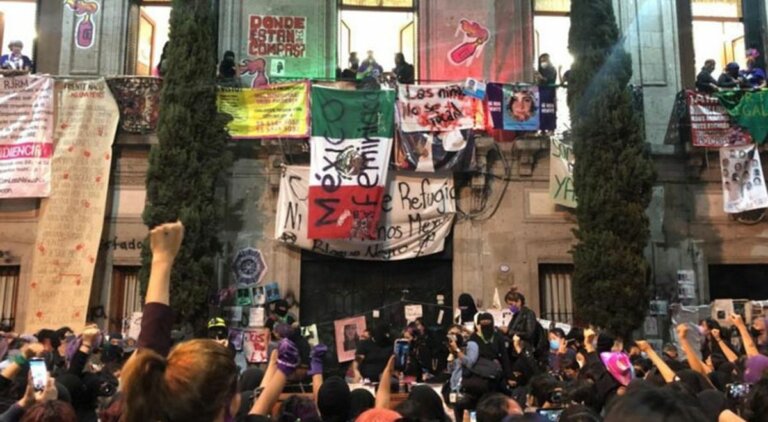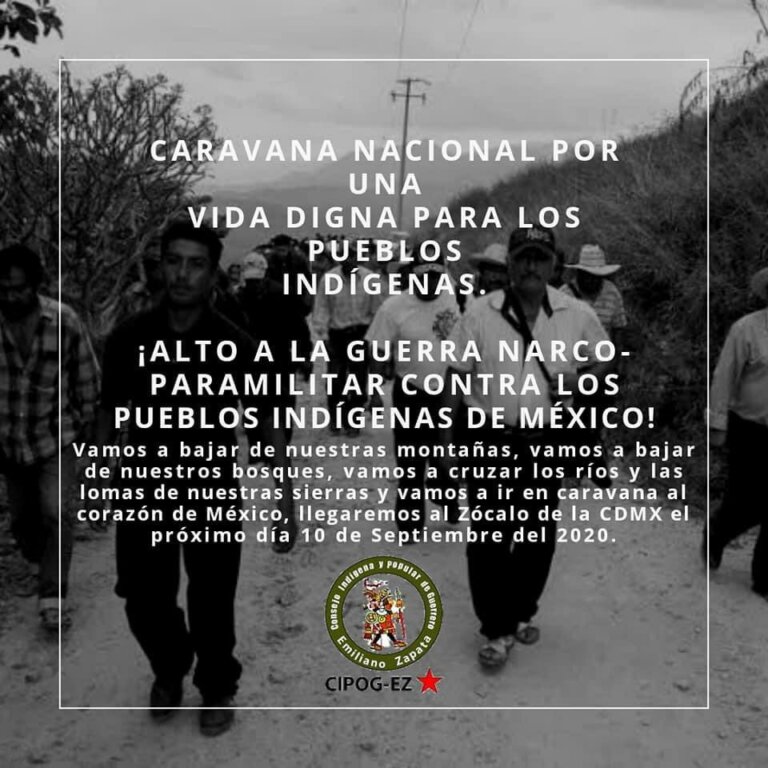San Crisóbal de las Casas, Chiapas, Mexico.
October 18, 2007 – Jennifer Truskowski writes: In Washington, DC on Tuesday, October 16, the Bush administration yet again revealed its plan to give Mexico military and police aid to fight drugs. The last time it was “revealed” at a press conference with the presidents of Mexico and Canada in August, Mr. Bush described it in incredibly vague terms. Details have been slowly surfacing in the press, but members of the U.S. government keep telling us that all the details are yet to come. Tuesday was supposedly the day.
But on Tuesday Stephen Johnson, the deputy assistant secretary of defense for the western hemisphere, emerged only to tell us that the details and figures of the plan are not yet confirmed. He told us that it will include helicopters, training, and boats for Mexico’s coast guard and navy. Past reports have said that it will also include hummers and arms, but we can’t confirm that because the details are not yet available. He also said it would cost the U.S. 1.5 billion dollars, not bothering to mention that according to other reports this is only for the first two years, while the plan is supposed to “span over many years.”
Johnson didn’t waste any time to engage in scare tactics though, saying that “Mexico is under siege,” which conjures up images of drug lords taking over cities and holding poor families captive in their homes while they force people to cultivate their drugs, and the police stand by helplessly because they lack our necessary weapons and hummers.
Mexico is indeed under siege, but not in the way that Johnson wants you to think it is. It’s under siege by its own corrupt government, military, and police force, which often have ties with drug peddling paramilitaries who carry out violent attacks in remote areas. Mexican soldiers also often use the drugs themselves. In the meantime, Mexico’s rural population is living in fear of its own military and police forces, which terrorize small communities. This is not where we should be putting military aid.
Every year I work with indigenous people in southern Mexico and hear of numerous cases of soldiers raping indigenous women, destroying indigenous property, and threatening communities, all without any legal recourse for the victims. This is not particular to southern Mexico; it happens all over the country. This is partly due to the fact that military crimes are investigated by its own military judicial system, which is like putting the wolf in charge of the sheep.
One case that illustrates this corruption is that of Ernestina Ascencio, a 72-year-old indigenous woman who was attacked in her home in the state of Veracruz on February 26, 2007, and who later died due to the injuries. Before she died, she told her family that soldiers had beaten and raped her. Initial investigations by Mexico’s Human Rights Commission determined that there was evidence that she had been raped and beaten, and stated that semen samples had been taken to the Secretary of Defense to be examined.
But the Defense Department released a report that said Ernestina had been raped by men dressed up like soldiers. Then later President Calderón made a public statement that she was never raped at all and had died of a pre-existing condition. Then the Human Rights Commission mysteriously changed its entire story, saying that there was no sign of abuse or rape, denying that there was even a semen sample, and also stating that she had died of a pre-existing condition. The Defense Department re-released its report it had made on the case, editing out the paragraph about men dressed as soldiers.
A doctor from the Mexican Human Rights Defense League (LIMEDDH in its Spanish initials) later examined the evidence independently and found extensive evidence that she had been violated. Her family and community have been devastated and are fearful of future attacks. Yet the perpetrators have never been charged or even investigated, and Ernestina’s case is now officially closed.
In other instances soldiers are guilty of using drugs themselves. In Sinaloa on June 1, 2007, roughly 20 soldiers opened fire on a truck carrying Adán Esparza Parra and his family. His wife and three children died, partially due to the fact that they were constantly stopped at military checkpoints and searched on the way to the hospital, despite the obvious need for medical attention. Later the Mexican Human Rights Commission found a hypodermic needle among the spent cartridges, and seven of those soldiers tested positive for cocaine and marijuana use. So much for fighting drugs.
Every year hundreds of crimes like this go unsolved, while the perpetrators are often government soldiers and police who are still roaming free in their official posts. These crimes have only increased in recent years, when massive protests were held against the corrupt government in Oaxaca and San Salvador Atenco. The federal police subsequently attacked protesters; women were raped on the way to jail, people were arrested without cause then tortured in jail, and peaceful citizens and even journalists were beaten and shot. One U.S. journalist, Brad Will, was shot and killed by while filming the conflict in Oaxaca, and neither the Mexican nor U.S. governments have made any effort to bring any of the perpetrators to justice. The Mexican government flatly denies any wrongdoing on its part.
It is horrifying and offensive that the U.S. government would even consider fighting drugs by giving military aid to such a shamelessly corrupt government. Any aid package to help Mexico fight drugs should not include military aid at all. It should include repealing or revising NAFTA, which has increased poverty in Mexico by cutting agricultural subsidies, and thus pushed more poor farmers to cultivate drugs to make a living… or be among the rapidly increasing numbers of immigrants entering the United States. Drug production in Mexico has increased dramatically since the implementation of NAFTA. Mexico should be made to give subsidies to small family farmers so they have better options.
We should also spend money to fight drug addiction here in the States without the use of prisons and guns. There are many drug addicts who seek treatment and are turned away every year for lack of resources. It’s time for congress to wake up and do something with my tax dollars that actually helps people instead of spreading more violence and costing more lives. Please contact congress and tell them to vote down Plan Mexico.
Jennifer Truskowski joyblue(at)hotmail.com
Sources:
Brayton, Colin. “The Ernestina Ascencio Case is Not Closed!” 28 May 2007.
Brayton, Colin. “Mexico: Defense Rewrites History in Ernestina Case.” 9 April 2007.
“Cierran Caso de Ernestina Ascencio.” Es Mas, Noticieras Televisa.
Dávila, Patricia. “La Tierra de los Narcos.” Proceso. 10 June 2007.
“Plan Mexico Details Emerge.” Earthwatch. 16 October 2007.
Schwartz, Jeremy. “U.S. Plan for Drug War Has Some in Mexico Worried.” Statesman.com. 15 October 2007.
Vera, Rodrigo. “Y Los Soldados No Dejaban de Disparar…” Proceso. 10 June 2007.
—
source: http://chicago.indymedia.org/archive/newswire/display/79803/index.php



What You Can Do to Oppose Plan Mexico
http://chicago.indymedia.org/newswire/display/79889/index.php